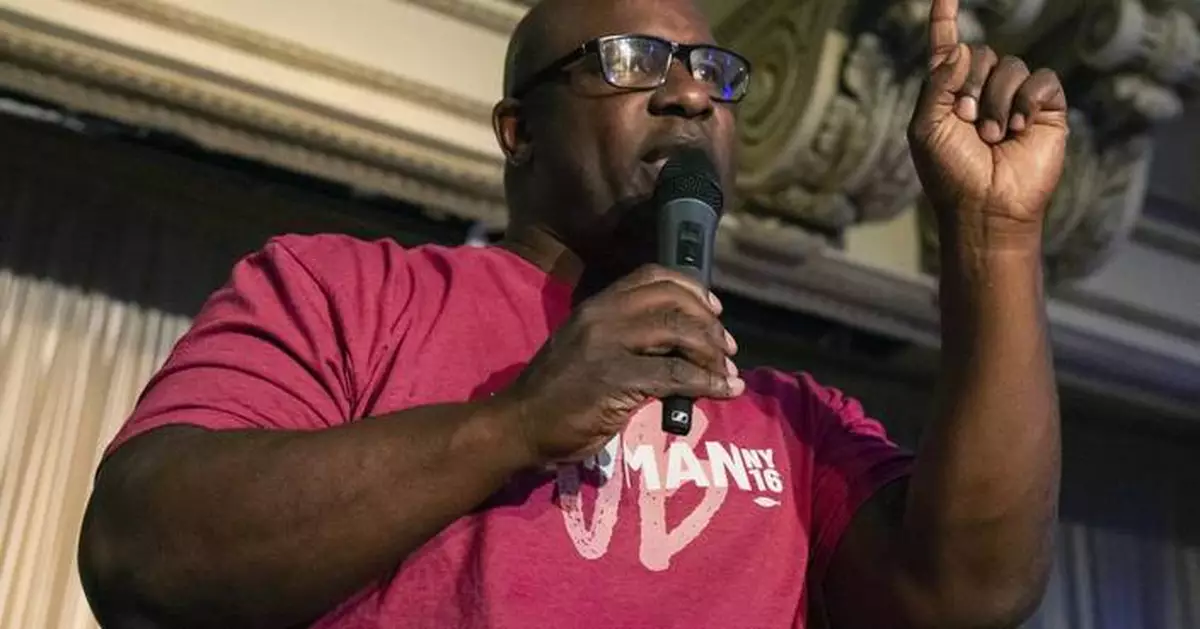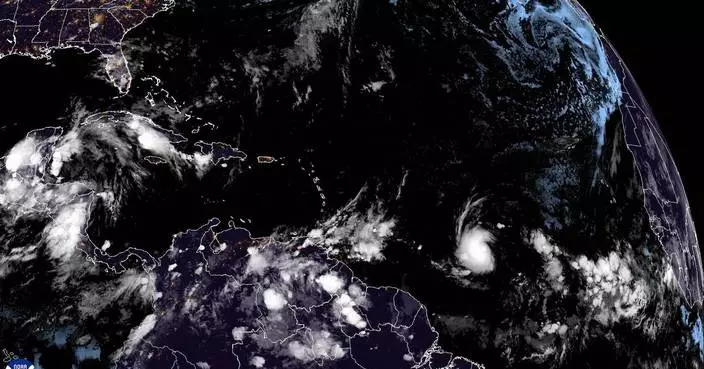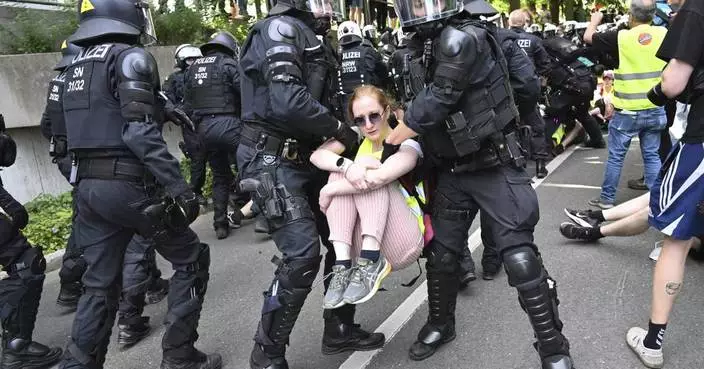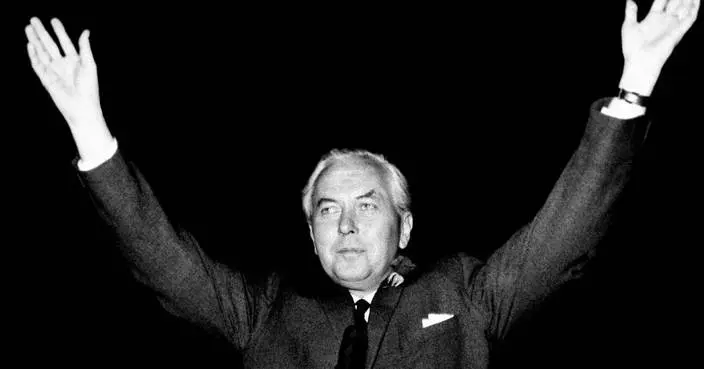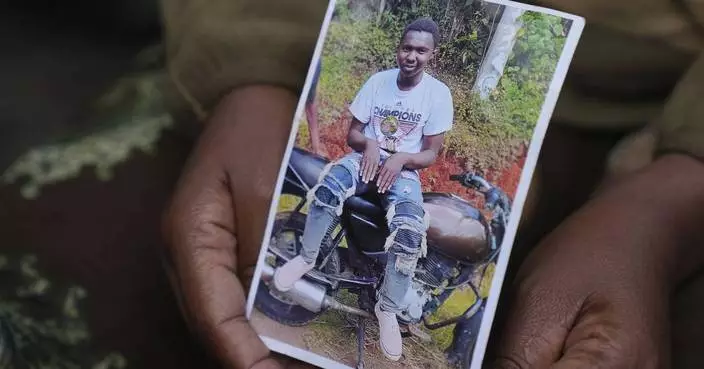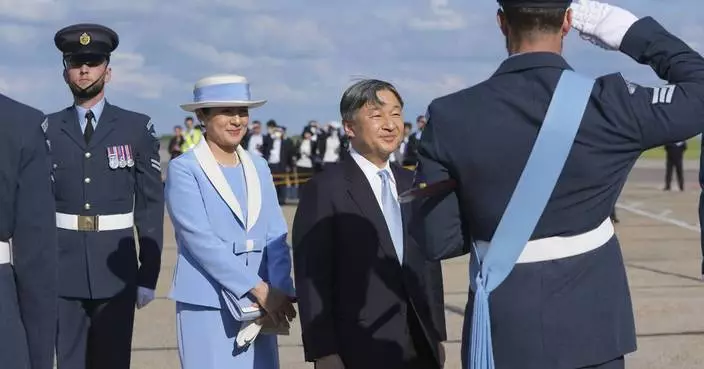WASHINGTON (AP) — When Jamaal Bowman first ran for Congress, he chastised his opponent — a 16-term Democratic congressman who chaired a powerful House committee — as disconnected from his suburban New York district and too focused on foreign policy.
The message helped Bowman defeat incumbent Rep. Eliot Engel and become the first Black man to represent the 16th Congressional District. But four years later, the case he made against Engel ended in his own political demise in one of the nation's most closely watched primaries, as he became the first member of the progressive band of liberals known as the “Squad” to lose a reelection bid.
“He became the very person he accused Engel of being,” Hank Sheinkopf, a veteran Democratic political consultant, said Wednesday. “Much more engaged in foreign affairs, less engaged in community-based activities. Much more rhetorical, much less constituent services.”
The decisive victory by 70-year-old George Latimer, a white centrist Democrat, handed the left flank its first electoral defeat this cycle, raising concerns about how other incumbents might fare in the coming months and, more broadly, whether progressives are in retreat in Washington.
“The pendulum has swung back,” said Jay Jacobs, chair of the New York Democratic Party. “It’s a clear indication that the Democratic Party has moved toward wanting common sense solutions, common sense governance and wants to favor those candidates, rather than those from the extreme.”
But progressives are warning that Bowman's defeat should not be seen as much of a bellwether as other factors made his path to reelection difficult. For starters, the district’s boundaries had shifted since Bowman first won office in 2020. Gone were most sections of the Bronx, which included the Black and brown voters crucial to his base, replaced by more of Westchester County’s suburbs.
Bowman, who declined to be interviewed after his loss, had other stumbles in recent years, including an incident in September when he was caught on video triggering a fire alarm in a House building while lawmakers were working on a funding bill. He said the alarm went off by accident when he tried to open a locked door while trying to vote, but Bowman was censured by his colleagues in the House.
But neither of those factors had as much impact, his congressional allies say, as the nearly $15 million the American Israel Public Affairs Committee allied super PAC spent on the race, helping make it the most expensive House primary on record, according to ad tracking firm AdImpact.
“I think all Democrats should be able to see how bad this is for Democratic politics that there’s a huge amount of money coming in to influence a congressional race in a Democratic primary,” Rep. Pramila Jayapal, chair of the Congressional Progressive Caucus, said in an interview.
With the backing of AIPAC and encouragement from local Jewish leaders to join the race, Latimer managed to oust not only one of the most liberal voices in Congress but one of its most outspoken critics of Israel. Bowman has accused Israel of committing genocide in Gaza, where tens of thousands of Palestinians have died in military strikes since the Oct. 7 attack by Hamas on southern Israel.
AIPAC and its affiliated super PAC filed airwaves and mailboxes with negative ads aimed at Bowman. He responded by accusing the pro-Israel group of trying to buy the race.
In a statement issued on primary night, AIPAC said the message sent by voters was clear.
“The outcome in this race once again shows that the pro-Israel position is both good policy and good politics — for both parties," the group said.
But Latimer said Bowman’s criticism of Israel was only part of the reason he decided to challenge the incumbent. He said the former middle school principal hadn’t been attentive to the needs of the district, maintained few relationships with its leaders and was more interested in appearing on television than in helping people.
During the campaign, Latimer, who served as a local and state official for three decades in the Westchester County area, said his knowledge of the region and its needs would make him an effective member of Congress. Latimer has said that’s the sort of politics people expect from their elected officials, rather than caustic fights between the far right and far left — a clear dig at Bowman.
Even Jayapal, who leads progressives on Capitol Hill and helps raise money for their political action committee, acknowledged the impact of the war on Bowman's race.
“I think Jamaal has a much harder district than many other progressives because a big section of the district is extremely wealthy and very connected to certain views about Israel and the Middle East,” the Washington Democrat said. “And then he has another part of the district that is very, very different. And I think it’s true for any member that we have to pay attention to all parts of our district.”
The next incumbent potentially at risk among progressives is Rep. Cori Bush in Missouri. Bush, who like Bowman has been vocal about Israel's bombardment of Gaza, is facing a wave of spending against her from AIPAC in the August primary race for her St. Louis district.
Jayapal and other progressives insisted Bowman's loss wouldn’t have sweeping implications for Bush or other progressive Democrats. But even they admitted that Tuesday's outcome put them on the defensive.
“The message to progressives is, stand by your values but don’t make unnecessary mistakes that can allow you to be singled out by right wing billionaires who want to make an example of someone," said Adam Green, co-founder of the Progressive Change Campaign Committee.
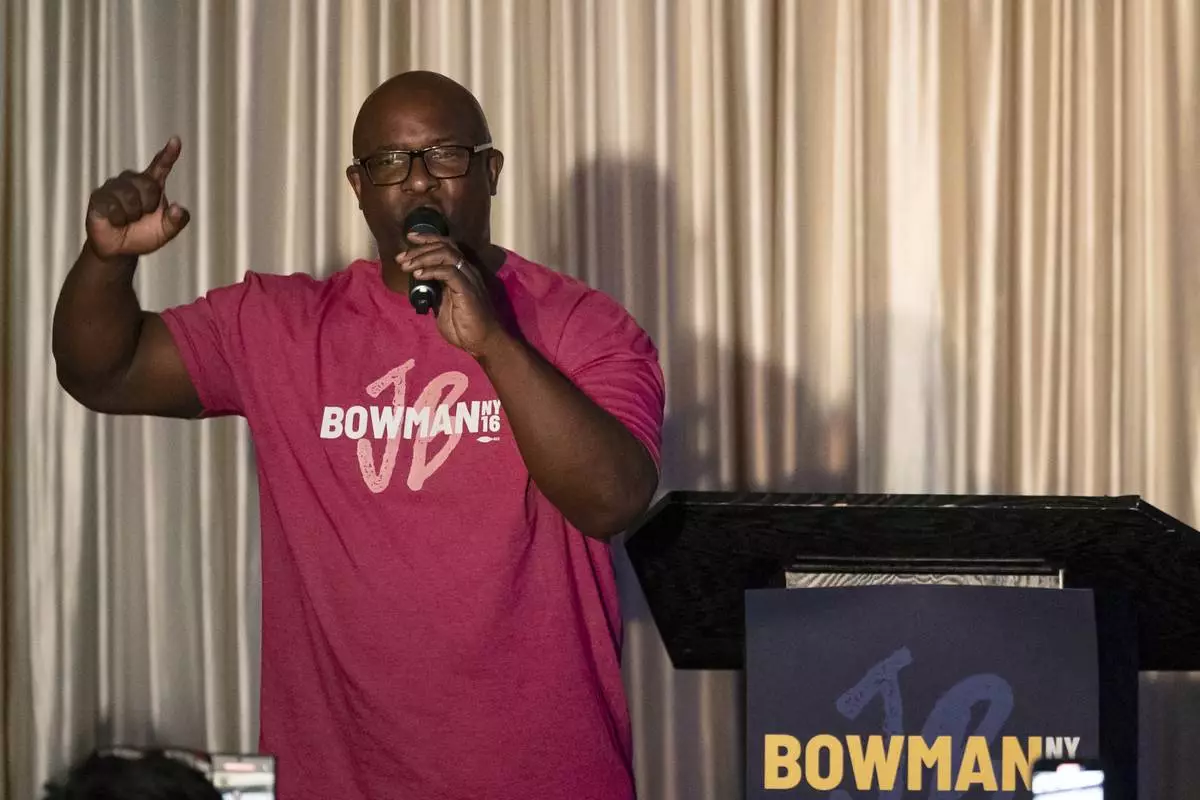
Rep. Jamaal Bowman, D-N.Y. speaks during a primary-night watch party Tuesday, June 25, 2024, in Yonkers, N.Y. George Latimer, a pro-Israel centrist, defeated Bowman in a Democratic primary in suburban New York that highlighted the party’s deep divisions over the war in Gaza. (AP Photo/Yuki Iwamura)
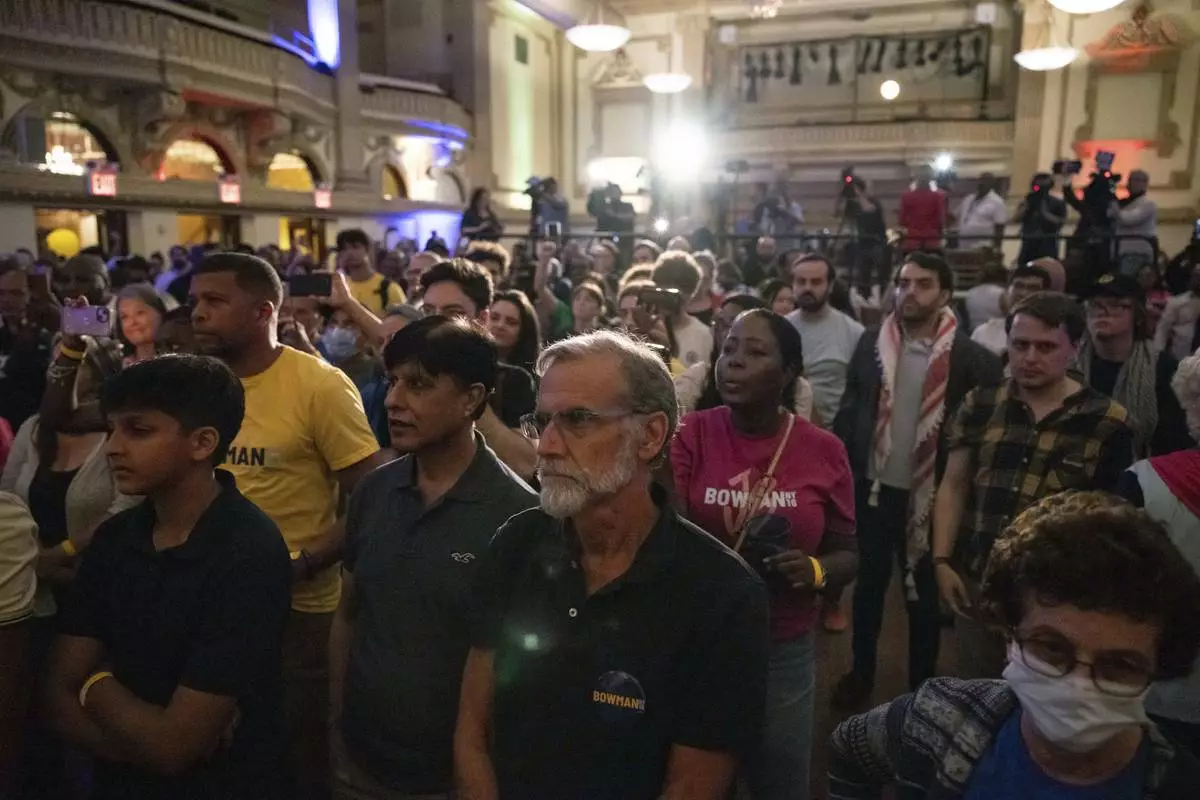
Supporters listen to Rep. Jamaal Bowman's, D-N.Y., speech during a primary election night watch party on Tuesday, June 25, 2024, in Yonkers, New York. (AP Photo/Yuki Iwamura)
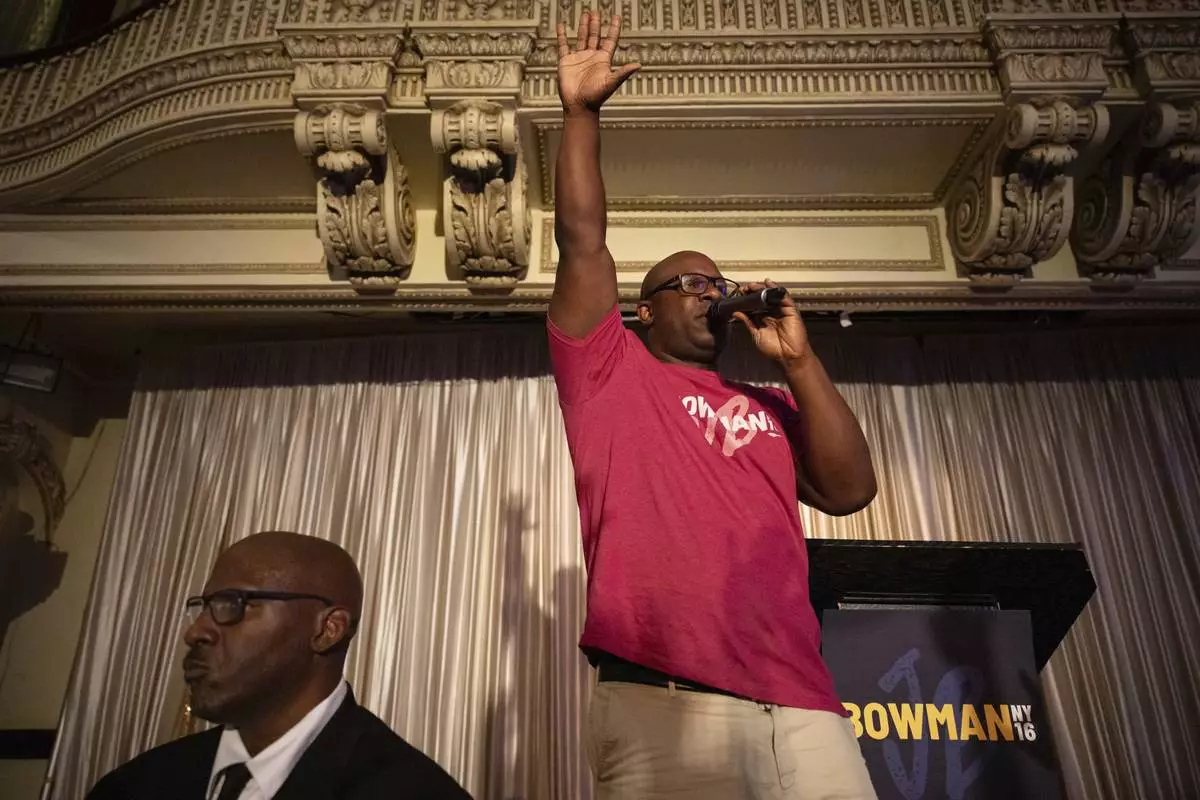
Rep. Jamaal Bowman, D-N.Y. speaks during an election night watch party on Tuesday, June 25, 2024, in Yonkers, N.Y. (AP Photo/Yuki Iwamura)
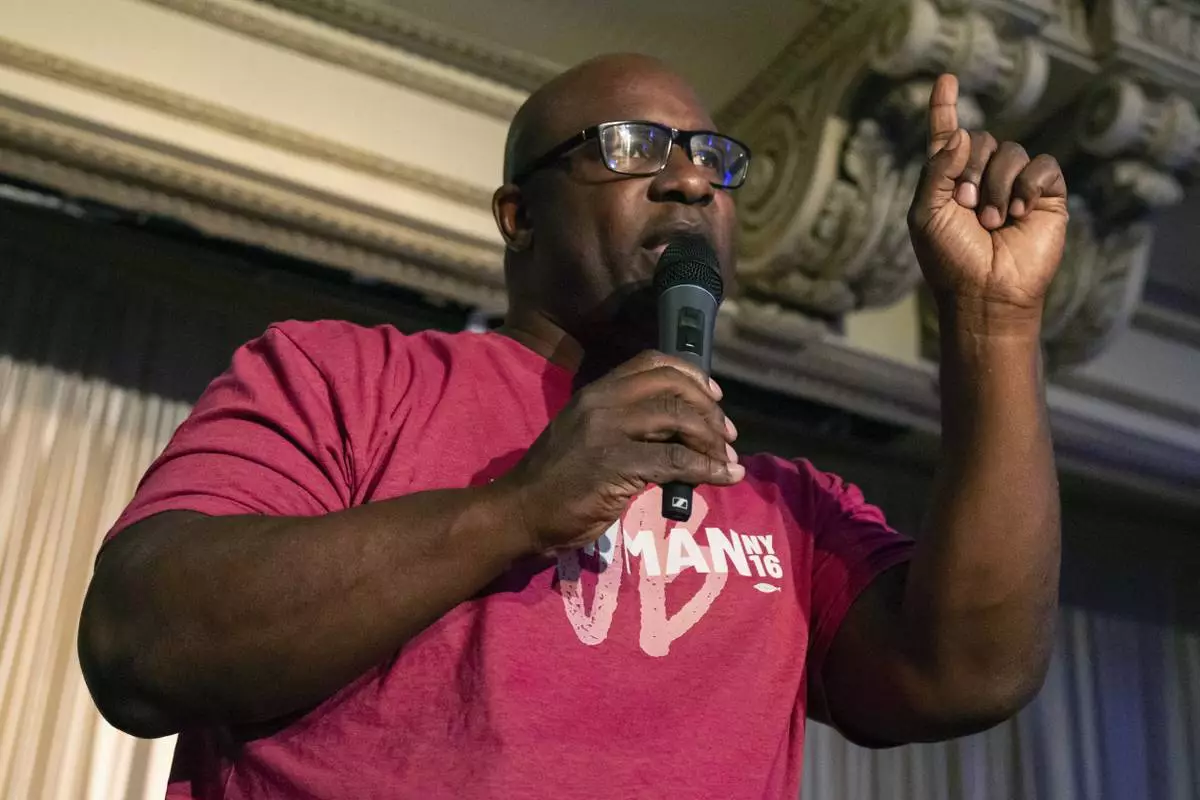
Rep. Jamaal Bowman, D-N.Y., speaks during a primary election night watch party, Tuesday, June 25, 2024, in Yonkers, New York. (AP Photo/Yuki Iwamura)
DUBAI, United Arab Emirates (AP) — Iran announced Saturday it will hold a runoff presidential election to replace the late hard-line President Ebrahim Raisi after an initial vote saw the top candidates not securing an outright win in the lowest turnout poll ever held in the Islamic Republic.
The election this coming Friday will pit reformist candidate Masoud Pezeshkian against the hard-line former nuclear negotiator Saeed Jalili.
Mohsen Eslami, an election spokesman, announced the result in a news conference carried by Iranian state television. He said of 24.5 million votes cast, Pezeshkian got 10.4 million while Jalili received 9.4 million.
Parliament speaker Mohammad Bagher Qalibaf got 3.3 million. Shiite cleric Mostafa Pourmohammadi had over 206,000 votes.
Iranian law requires that a winner gets more than 50% of all votes cast. If not, the race’s top two candidates advance to a runoff a week later. There’s been only one runoff presidential election in Iran’s history: in 2005, when hard-liner Mahmoud Ahmadinejad bested former President Akbar Hashemi Rafsanjani.
Eslami acknowledged the country's Guardian Council would need to offer formal approval, but the result did not draw any immediate challenge from contenders in the race.
As has been the case since the 1979 Islamic Revolution, women and those calling for radical change have been barred from running, while the vote itself will have no oversight from internationally recognized monitors.
There were signs of the wider disenchantment of the public with the vote. More than 1 million votes were voided, according to the results, typically a sign of people feeling obligated to cast a ballot but not wanting to select any of the candidates.
The overall turnout was 39.9%, according to the results. The 2021 presidential election that elected Raisi saw a 48.8% turnout, while the March parliamentary election saw a 40.6% turnout.
Despite the low turnout, Interior Minister Ahmad Vahidi praised the public for turning out to a vote conducted without any internationally recognized observers.
He thanked the people who voted for their “very valuable presence,” adding that the election was held in “complete safety” and “with very serious competition.”
There had been calls for a boycott, including from imprisoned Nobel Peace Prize laureate Narges Mohammadi. Mir Hossein Mousavi, one of the leaders of the 2009 Green Movement protests who remains under house arrest, has also refused to vote along with his wife, his daughter said.
There’s also been criticism that Pezeshkian represents just another government-approved candidate. In a documentary on the reformist candidate aired by state TV, one woman said her generation was “moving toward the same level” of animosity with the government that Pezeshkian’s generation had in the 1979 revolution.
Jalili, once described by CIA director Bill Burns as “stupefyingly opaque” in negotiations, likely would have won outright had the three hard-liners not split Friday's vote.
Qalibaf, a former general in Iran's paramilitary Revolutionary Guard, had been thought to have a wider power base, despiting being plagued by corruption allegations. He is also known for launching a violent crackdown on Iranian university students in 1999 and reportedly ordering live fire to be used against students in 2003 while serving as the country’s police chief.
Now the question becomes whether Pezeshkian will be able to draw voters into his campaign. On Election Day, he offered comments on outreach to the West after voting seemingly aimed at drumming up turnout for his campaign — even after being targeted by a veiled warning from Supreme Leader Ayatollah Ali Khamenei.
“Though he has received notable endorsements from major reformist figures, including former Presidents (Hassan) Rouhani and Mohammad Khatami, Pezeshkian has been a generally underwhelming candidate,” the geopolitical consultancy Eurasia Group said in an analysis before the vote. “Should he qualify for a runoff, his position would weaken as the conservative voting bloc unites behind a single candidate.”
Raisi, 63, died in the May 19 helicopter crash that also killed the country’s foreign minister and others. He was seen as a protégé of Khamenei and a potential successor. Still, many knew him for his involvement in the mass executions that Iran conducted in 1988, and for his role in the bloody crackdowns on dissent that followed protests over the death of Mahsa Amini, a young woman detained by police over allegedly improperly wearing the mandatory headscarf, or hijab.
The voting came as wider tensions have gripped the Middle East over the Israel-Hamas war in the Gaza Strip.
In April, Iran launched its first-ever direct attack on Israel over the war in Gaza, while militia groups that Tehran arms in the region — such as the Lebanese Hezbollah and Yemen’s Houthi rebels — are engaged in the fighting and have escalated their attacks.
Meanwhile, the Islamic Republic continues to enrich uranium at near weapons-grade levels and maintains a stockpile large enough to build — should it choose to do so — several nuclear weapons.
Despite the recent unrest, there was only one reported attack around the election. Gunmen opened fire on a van transporting ballot boxes in the restive southeastern province of Sistan and Baluchestan, killing two police officers and wounding others, the state-run IRNA news agency reported. The province regularly sees violence between security forces and the militant group Jaish al-Adl, as well as drug traffickers.
Vahdat reported from Tehran, Iran. Nasser Karimi in Tehran, Iran, contributed to this report.
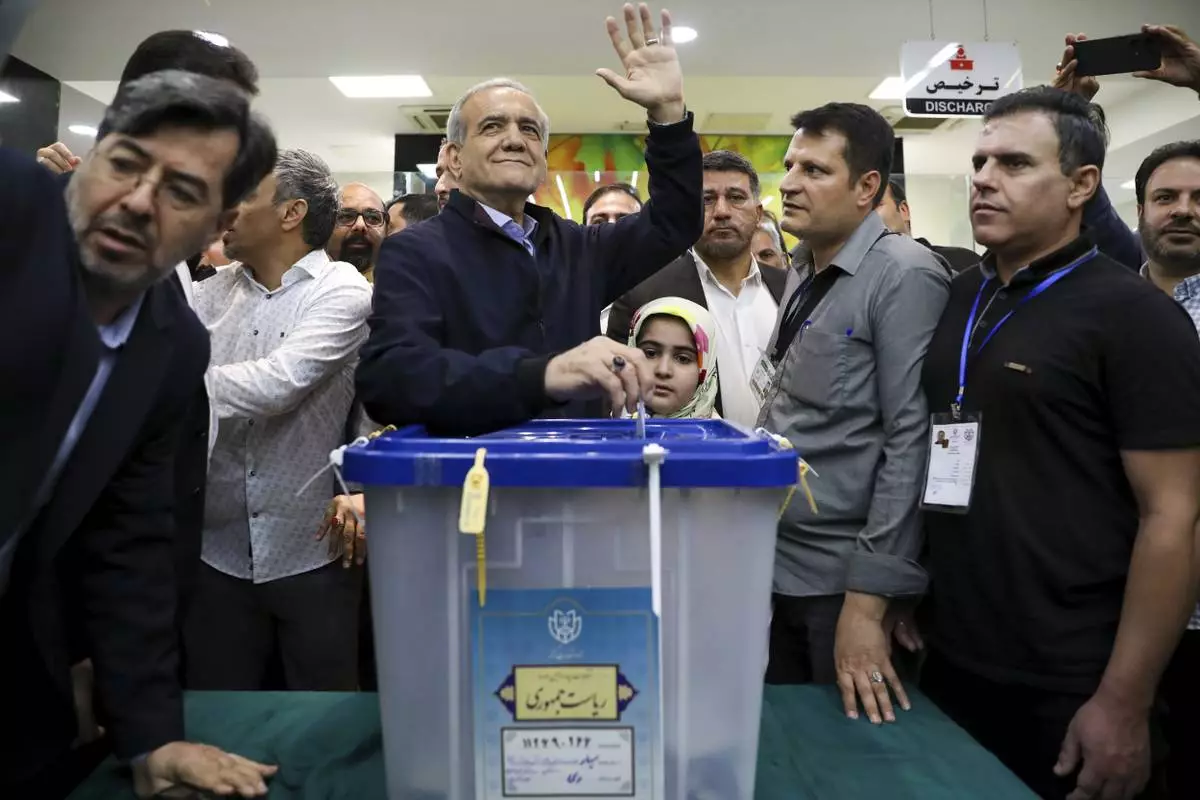
In this photo provided by Iranian Students' News Agency, ISNA, reformist candidate for the Iranian presidential election Masoud Pezeshkian casts his ballot as he waves to media in a polling station, in Tehran, Iran, Friday, June 28, 2024. Iranians are voting in a snap election to replace the late hard-line President Ebrahim Raisi. (Majid Khahi, ISNA via AP)
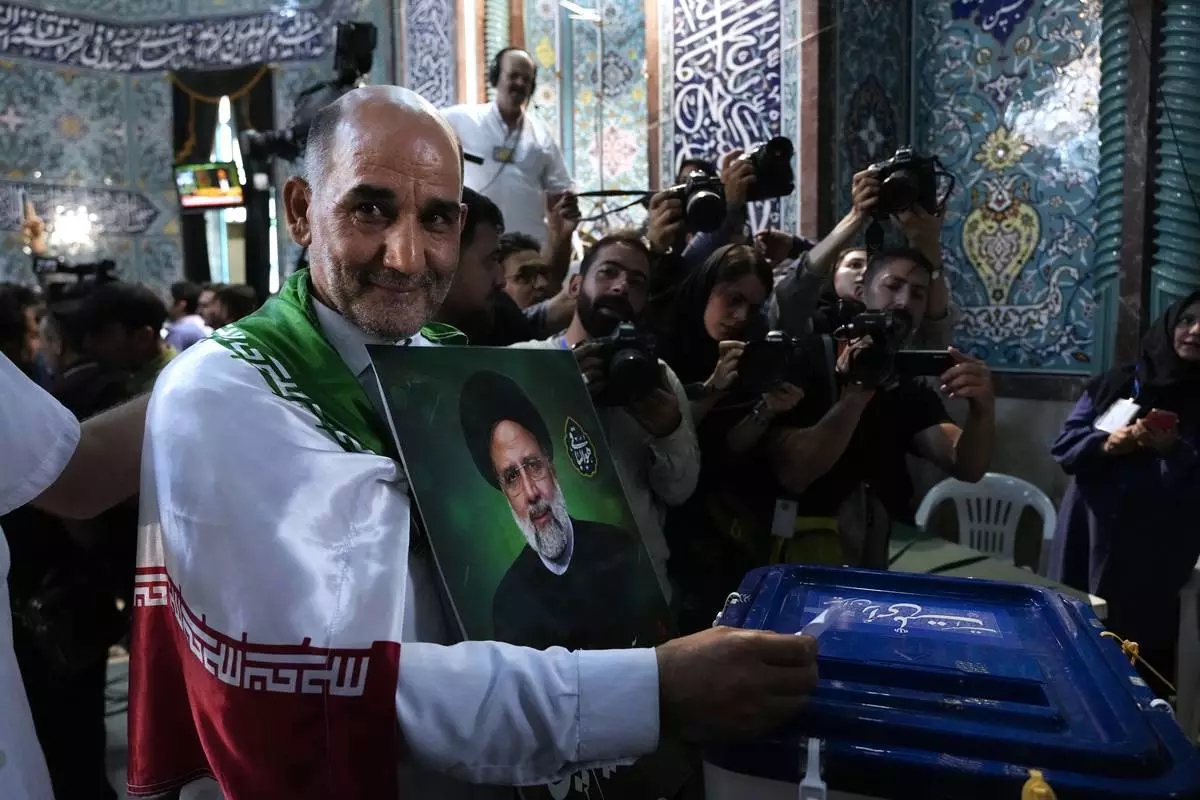
A man casts his ballot during the presidential election as he holds a picture of the late President Ebrahim Raisi in a polling station, in Tehran, Iran, Friday, June 28, 2024. Iranians were voting Friday in a snap election to replace the late President Ebrahim Raisi, killed in a helicopter crash last month, as public apathy has become pervasive in the Islamic Republic after years of economic woes, mass protests and tensions in the Middle East. (AP Photo/Vahid Salemi)
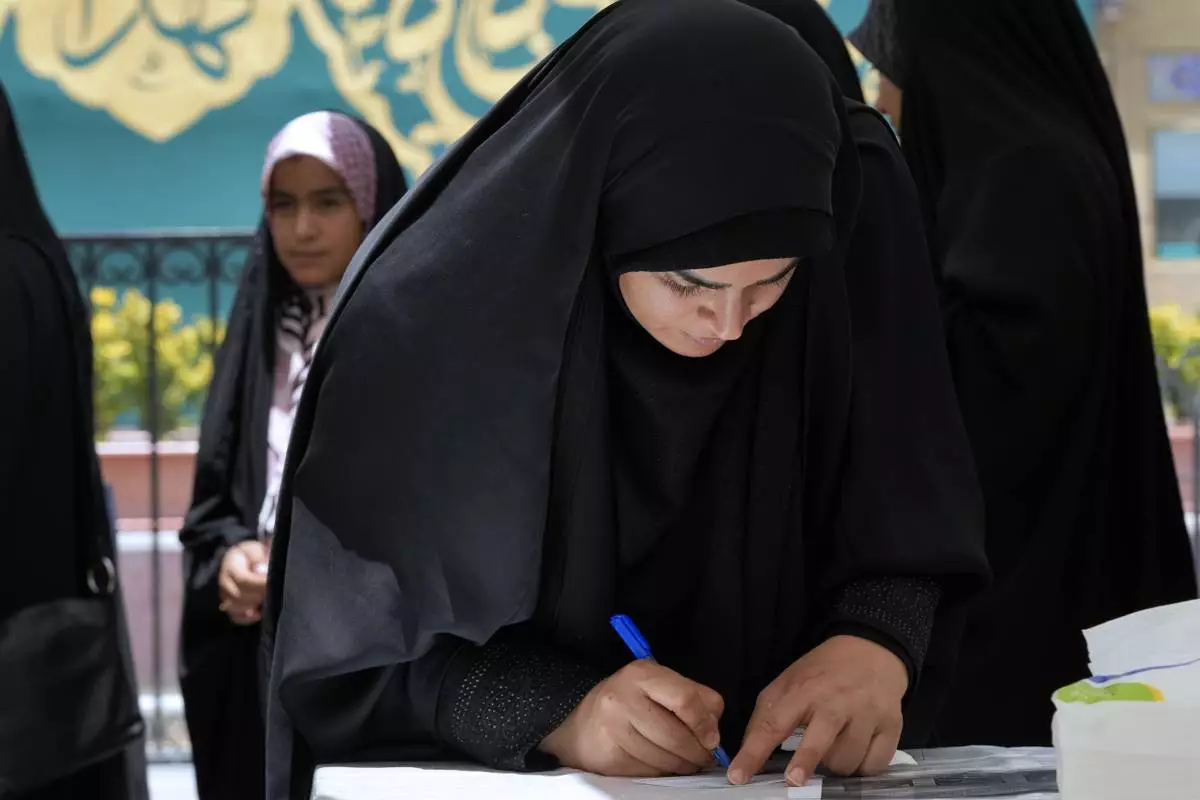
A woman fills out her ballot during the Iranian presidential election in a polling station at the shrine of Saint Saleh in northern Tehran, Iran, Friday, June 28, 2024. Iranians were voting Friday in a snap election to replace the late President Ebrahim Raisi, killed in a helicopter crash last month, as public apathy has become pervasive in the Islamic Republic after years of economic woes, mass protests and tensions in the Middle East. (AP Photo/Vahid Salemi)
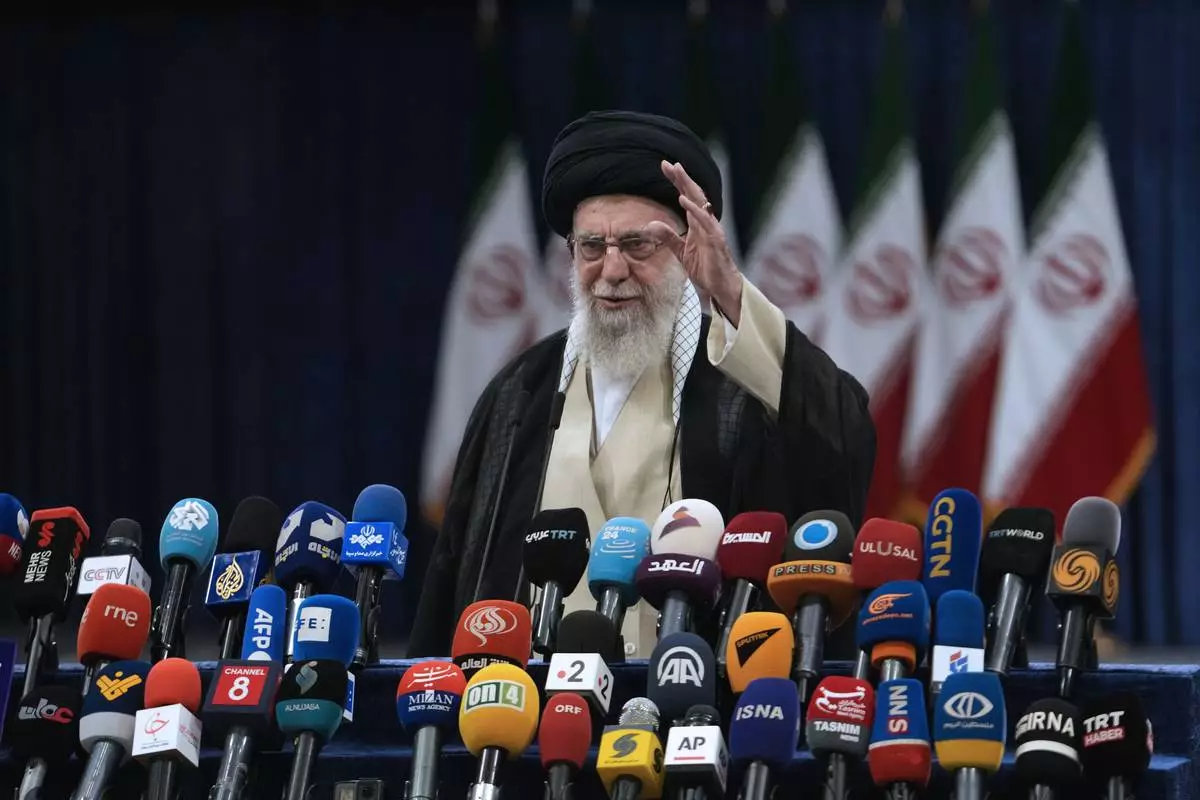
Iranian Supreme Leader Ayatollah Ali Khamenei waves to media after casting his vote during the presidential election in Tehran, Iran, Friday, June 28, 2024. Iranians were voting Friday in a snap election to replace the late President Ebrahim Raisi, killed in a helicopter crash last month, as public apathy has become pervasive in the Islamic Republic after years of economic woes, mass protests and tensions in the Middle East. (AP Photo/Vahid Salemi)
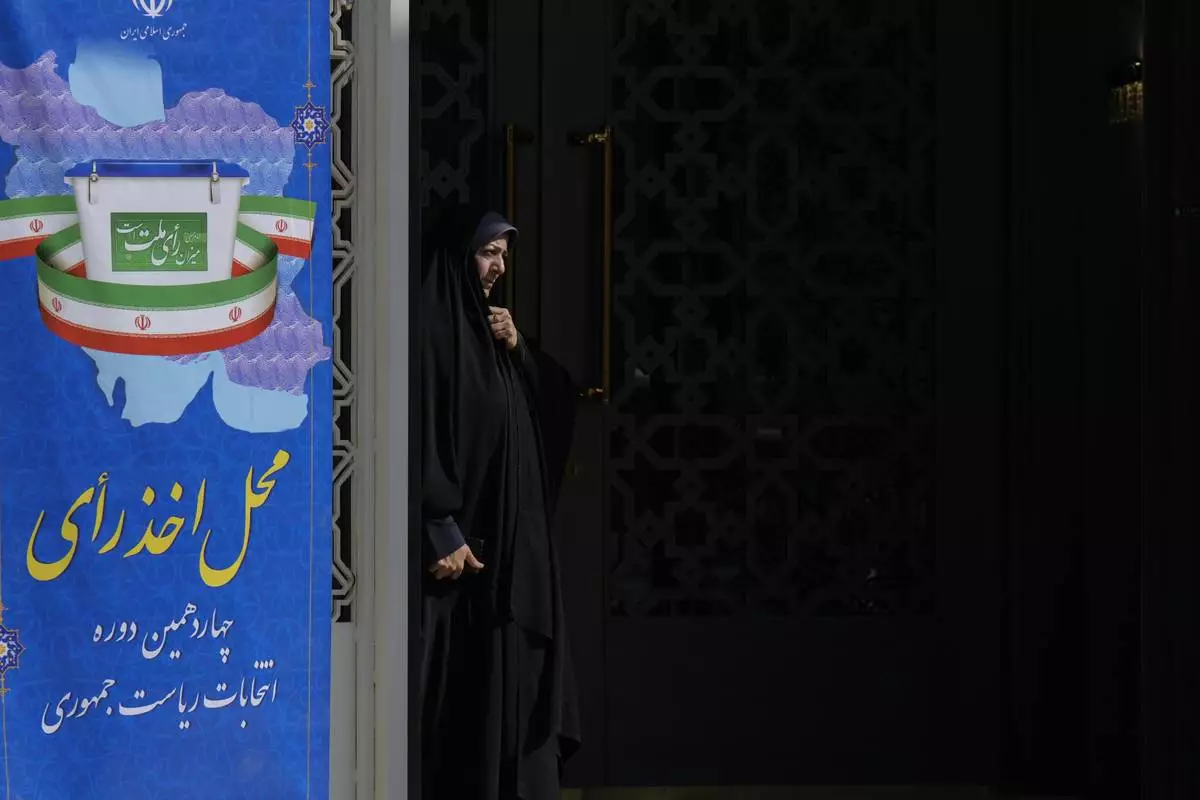
A woman prepares to casts her ballot during the presidential election at a polling station inside the Iranian embassy in Baghdad, Iraq, Friday, June 28, 2024. Iranians are voting in a presidential election to replace the late President Ebrahim Raisi, killed in a helicopter crash in May along with the country's foreign minister and several other officials. (AP Photo/Hadi Mizban)
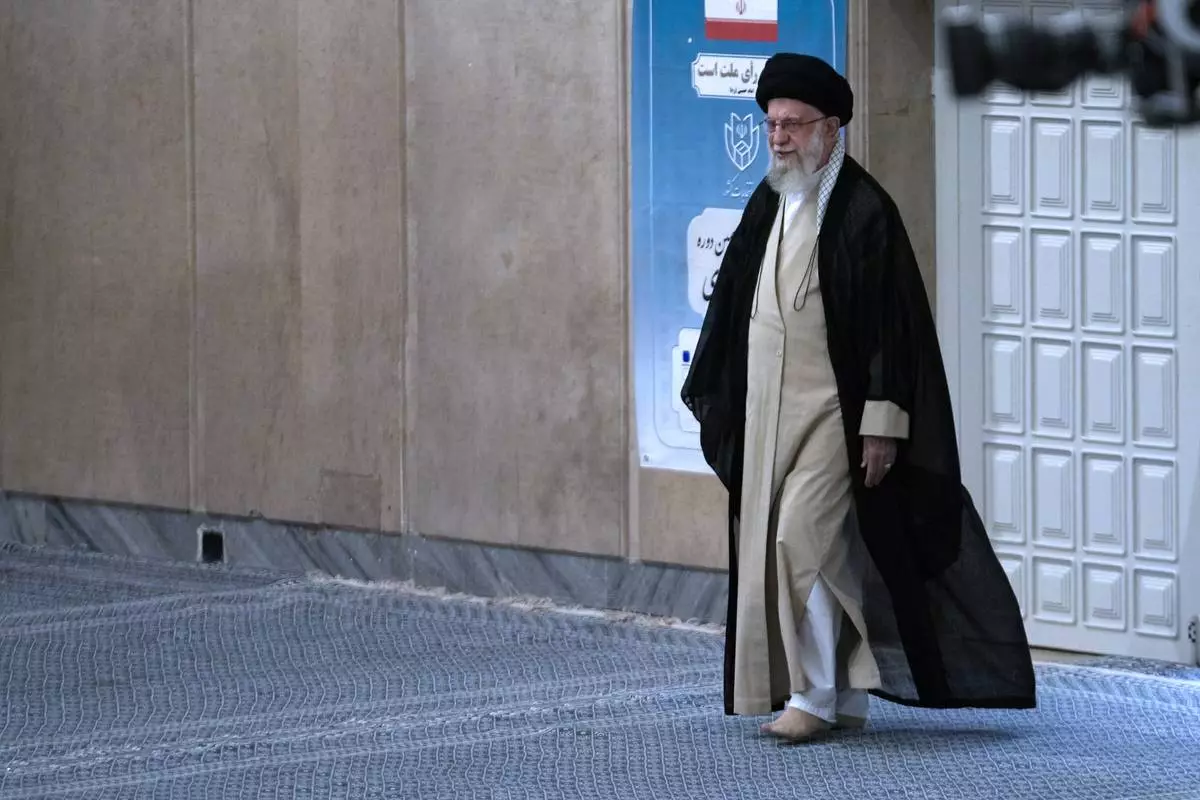
Iranian Supreme Leader Ayatollah Ali Khamenei arrives to vote for the presidential election, in Tehran, Iran, Friday, June 28, 2024. Iranians voted Friday in a snap election to replace the late hard-line President Ebrahim Raisi, with the race's sole reformist candidate vowing to seek "friendly relations" with the West in an effort to boost his campaign. (AP Photo/Vahid Salemi)
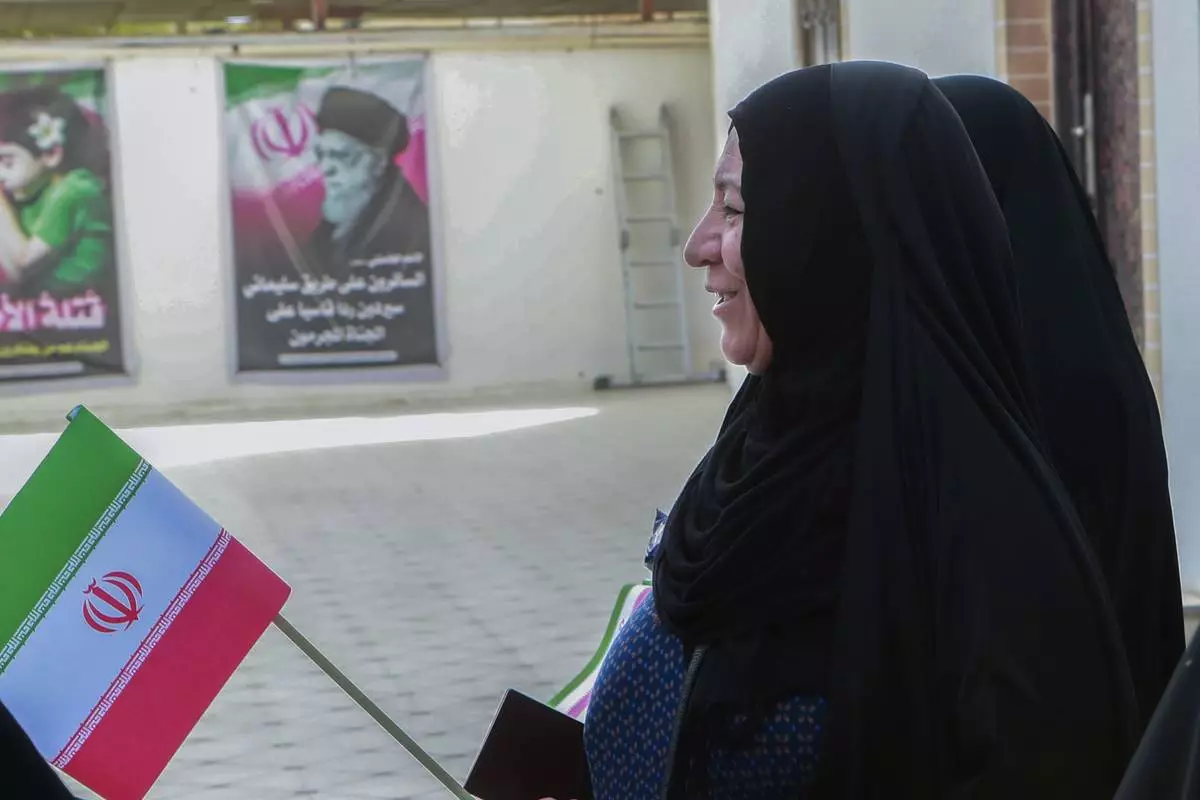
A woman prepares to casts her ballot during the presidential election at the Iranian consulate in Basra southeast of Baghdad, Iraq, Friday, June 28, 2024. Iranians are voting in a presidential election to replace the late President Ebrahim Raisi, killed in a helicopter crash in May along with the country's foreign minister and several other officials. (AP Photo/Nabil al-Jourani)
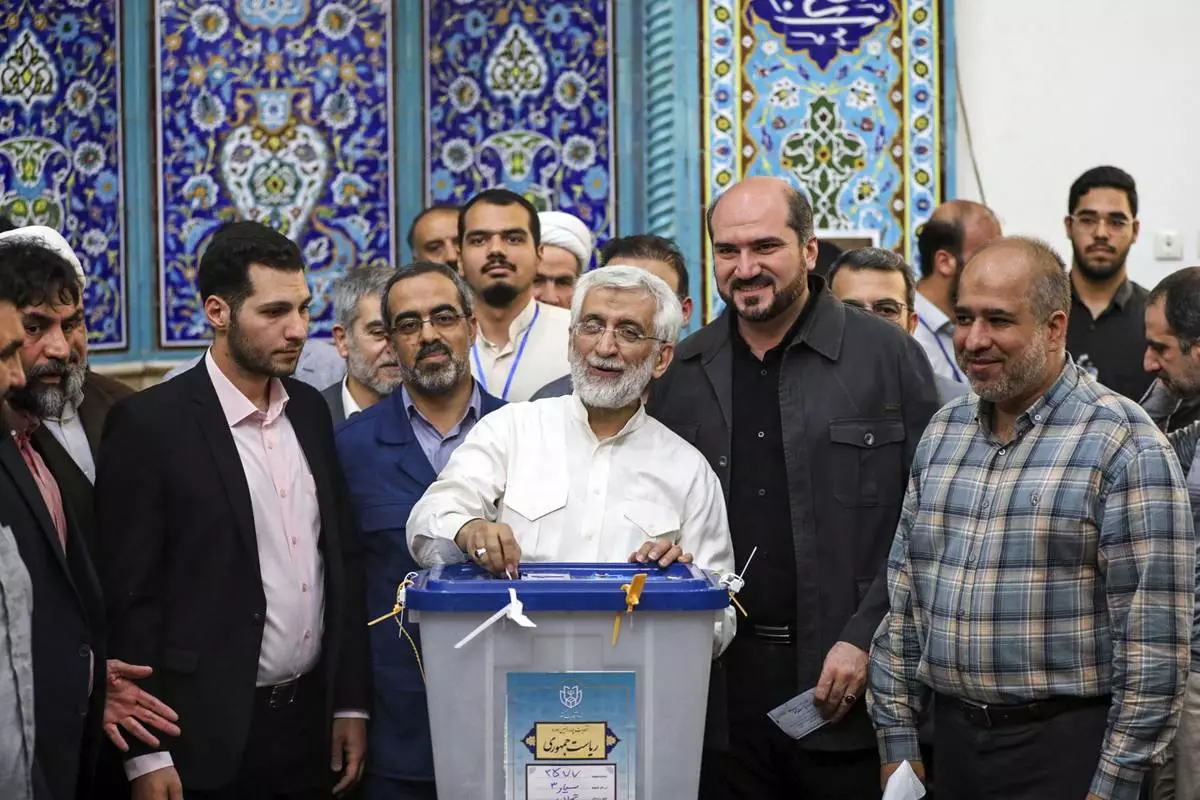
In this photo provided by Iranian Students' News Agency, ISNA, hard-line former Iranian senior nuclear negotiator and candidate for the presidential election Saeed Jalili casts his ballot in a polling station, in Tehran, Iran, Friday, June 28, 2024. Iranians are voting in a snap election to replace the late hard-line President Ebrahim Raisi. (Alireza Sotakabr, ISNA via AP)






